The stories of four women are woven together in Dreamwell Theatre’s ‘The Revolutionists’
Returning for their first show since the COVID-19 pandemic, Dreamwell Theatre presents ‘The Revolutionists,’ a comedy taking place during the French Revolution.
Kristina Rutkowski, playing Olympe de Gouges, speaks in “The Revolutionists” at Dreamwell Theatre in Iowa City on Thursday, Feb. 24, 2022.
February 25, 2022
A revolutionist who holds a letter for her lover in case she dies; an assassin with strong convictions coming to terms with the consequences of her actions; a former queen who is humanized as the audience remembers she is a wife, mother, and woman; a playwright who brings all these characters together, realizing herself how unjust reality really is.
Dreamwell Theatre tells the story of these four women and their interwoven tale in The Revolutionists, looking into the depths of the French Revolution from an intersectional perspective.
The Revolutionists will show on Feb. 25-26, March 4, and March 5. The show is taking place at Iowa City venue The Artifactory, formerly known as Public Space One.
Originally, the show was supposed to open in May 2021. The show’s director, Matthew Brewbaker, explained that the show was postponed because of COVID-19 concerns. The Revolutionists is Dreamwell’s first show back since closing for the pandemic.
“We didn’t feel like it was an appropriate show to do virtually,” Brewbaker said. “You don’t get the costume, you don’t get that interaction as well. So, we decided to kind of keep it as our first show back whenever that would be.”
The show itself is a comedy told through the meta-perspective of playwright Olympe de Gouges, played by actress Kristina Rutkowski, who attempts to capture a dramatic story during the French Revolution. Characters reference and announce stage directions, as well as poke fun at the world of theater and playwriting as a whole.
Despite the comedic elements, the show doesn’t shy away from addressing serious topics. The initial humor allows the audience to connect with the four women in the show, so that when tragedy strikes, it is even more impactful.
The characters themselves are portrayed with excellence, balancing comedy with reality. Marie Antoinette, played by Eva Giacomo, enters the stage in a huge pink dress and wig decorated with pearls, embodying the hyper-glamorized persona of a former queen. Yet, throughout the play, the audience sees cracks in the figurehead’s facade, which humanizes her to a point of understanding.
RELATED: Ten-Minute Play Festival returns with work from UI theater undergraduates
The assassin Charlotte Corday is played by Jennifer Beall, a University of Iowa graduate student in the School of Library and Information Science. Corday wants to murder extremist journalist Marat to take a stand against mass violence in France, and her convictions are strong. Beall expressed how fun it is playing Corday, and said that capturing the nuances of her characters was an exciting challenge to tackle as an actress.
“As a character, it’s really fun to play as someone who just has that certainty of her actions and is determined to do what she thinks is the right thing,” Beall said. “Later in the play, after she’s done it, we kind of get to see a crack in that facade a little bit where we see some other emotions come through.”
Actress Sarahann Kolder plays Marianne Angelle, a Haitian woman fighting for the rights of enslaved people in the Caribbean. Angelle shows both emotional vulnerability and strength throughout the play, often acting as a voice of reason to counter the brash actions of the other characters.
Kolder’s character also highlights a deeper problem regarding intersectionality during the French Revolution. Angelle points out the hypocrisy of the white men fighting for freedom, considering that slavery was still present in French colonies and women did not have equal rights to men.
The final character that acts as the driving connector for these characters — literally writing them together — is playwright Olympe de Gouges. Rutkowski successfully captures the character of an artist who is trying to find the place where she fits amid tragedy.
These four characters are woven together, growing through hardship with each other. Surrounded by death and struggle, these women fight to pave their own paths in history.
Brewbaker attests that this play could not have been done in a virtual setting. Through the extravagant costuming, raw emotion, and meta-elements, a live audience is essential for this piece to maximize the impact that it has.
“The virtual stuff worked really well for a while to kind of keep theaters up and moving, but a wall was definitely hit there where it’s like, okay, I think we’ve learned there’s only so far you can go with that,” Brewbaker said. “We just need that live interaction and the movement and that, so we’re just super excited to be back.”















